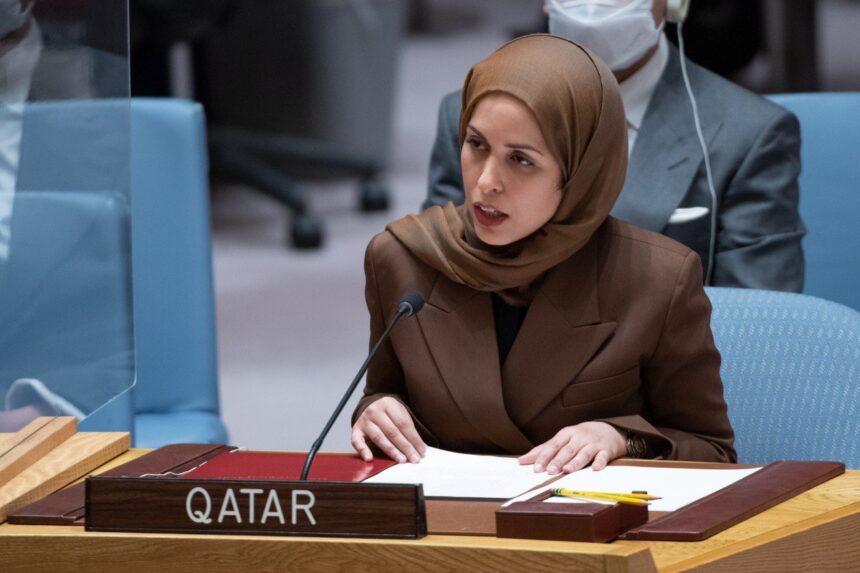RASC News Agency: Addressing an open meeting of the UN Security Council, Alya Ahmed bin Saif Al‑Thani, Qatar’s Permanent Representative to the United Nations, reaffirmed Doha’s pledge to continue working for peace and stability in Afghanistan. She underlined that Qatar is hosting the UN‑led Doha Process, a track ostensibly designed to return Afghanistan to the international community. Yet she also conceded what the world already knows: the Taliban’s systemic erasure of women and girls from public life, its refusal to form an inclusive government, and its sweeping human‑rights violations are the principal obstacles to any serious international acceptance of the regime.
In practice, global engagement with the Taliban remains narrow and distrustful, concentrated on two utilitarian files: curbing narcotics trafficking and propping up fragments of Afghanistan’s private sector. The limited scope of this interaction is telling. It reflects a broad consensus that the Taliban cannot be trusted that their governance, particularly on the question of women’s rights, has sealed Afghanistan into deepening isolation. Still, Qatar has emerged as one of the key diplomatic hubs for the Taliban, acting as a conduit between the group and Western capitals. Most recently, Doha brokered the transfer of 81 Afghanistani deportees from Germany back to Afghanistan and facilitated Berlin’s quiet acceptance of two Taliban diplomats a move that drew fierce domestic criticism inside Germany for conferring de facto legitimacy on a regime under international censure for gender apartheid and systematic repression.
Qatar’s role is neither new nor ideologically neutral. During the previous Afghanistani government, Doha hosted the Taliban’s political office and played a central part in facilitating talks between the Taliban, the United States, and Kabul. Those negotiations were heralded as a diplomatic breakthrough; today, many analysts argue they cleared the runway for the Taliban’s reconquest, collapsing an already fragile state and ushering in a political order defined by exclusion, coercion, and theocratic absolutism. The Taliban’s conduct since August 2021 the ban on girls’ secondary and higher education, the destruction of women’s public presence, public floggings, arbitrary detentions, and the suffocation of free media has not merely widened the gap with the world; it has codified gender persecution as state policy.
Doha’s mediating posture, then, functions as a double‑edged instrument. On the one hand, it creates a diplomatic corridor through which humanitarian concerns and technical cooperation can pass. On the other, it risks laundering the Taliban’s image, allowing the regime to claim a veneer of international engagement without paying the political price of reform. The Taliban exploit these platforms to market performative gestures token statements on counter‑narcotics or private‑sector “revitalization” while stonewalling every meaningful demand on human rights, women’s participation, inclusive governance, and accountability for abuses.
The German case illustrates the danger. Forced returns of Afghanistani nationals to Taliban‑controlled territory even if procedurally dressed up as bilateral coordination collide head‑on with international law’s prohibition of refoulement when those individuals face a substantial risk of persecution or torture. Accepting Taliban-appointed diplomats further blurs the line between pragmatic contact and political recognition. As long as women are barred from education and work, civil society is throttled, minorities are persecuted, and corporal punishment is brandished as public theater, every photo‑op with Taliban officials sends precisely the wrong signal: that the international community is prepared to normalize the abnormal.
For its part, Qatar argues that it is creating space for dialogue, not legitimization. But dialogue without verifiable, enforceable benchmarks on rights and inclusion does not moderate the Taliban; it incentivizes their intransigence. Mediation that does not condition access, funding, or diplomatic platforms on concrete improvements reopening girls’ schools, restoring women’s right to work, ending arbitrary detentions and public floggings, permitting an independent press, and allowing UN human-rights monitors unfettered access risks becoming a diplomatic cul‑de‑sac: plenty of meetings, no movement, and a regime that tightens its grip while the world talks.
If the stated objective is to “return Afghanistan to the international community,” then the sequencing must be unambiguous: rights first, recognition later. Anything else reverses the moral and legal hierarchy, rewarding the perpetrators while abandoning the victims. States engaging through Doha or any other forum should therefore adopt a strict conditionality regime: no formal representation upgrades, no easing of financial constraints, no participation in high‑profile international platforms until measurable human‑rights benchmarks are met and independently verified.
There is a hard truth at the heart of this debate. Peace is not the mere absence of warplanes; it is the presence of rights, law, and dignity. Qatar can host as many processes as it wishes, and Western capitals can justify tactical engagement on the narrowest technical grounds, but Afghanistan cannot be “reintegrated” on the backs of silenced women, persecuted minorities, and terrorized journalists. A process that ignores them is not a peace process; it is an architecture of erasure.
If the international community truly intends to help Afghanistan rejoin the world, it must refuse to pretend that gender apartheid, censorship, and public cruelty are compatible with stability. The Taliban have made their calculus: power without legitimacy, control without consent. The world must make its own: engagement without leverage is complicity, and mediation without conditions is capitulation.






